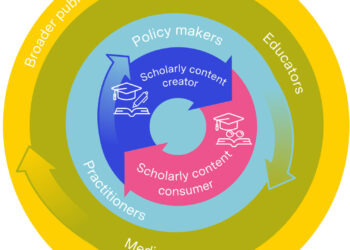
This year’s SSP Annual Meeting is, by all accounts, a huge success, with more than 850 attendees (a new record), a busy and interesting exhibit hall, excellent speakers (including a keynote from Tim O’Reilly), and a host hotel with a layout that encourages networking and interaction.
During the first two days, I’ve had some stray thoughts, none of which merits a full blog post and not all of which come directly from things said at sessions, but I wanted to record some of these thoughts nonetheless.
A Failure to Appreciate the Amplification Effect — Publication programs are one of the major financial contributors to most professional societies. These programs benefit from an amplification effect — the efforts of a minority of members (authors and editors) and in many cases a good supply of non-members are amplified by sales of the resulting content around the world. A small state medical society can produce a dominant medical journal. A small optical society can become a power for good in its field because its journals and books are valued by people around the globe. There is often a high ratio of benefit to effort. Open access (OA) rewards a different kind of scale — the scale of production, not of consumption. This creates a 1:1 relationship between work done and revenues, causing scale and output to correlate. There are many profound questions that shifting to a 1:1 work:revenue model poses, including whether there are enough information producers to sustain this model, whether your organization can compete against more efficient and fully-scaled competitive outlets, and whether your reach and reputation is improved if your bargain with authors becomes purely based on speed and expense.
The Opposite of Disruption is Domination — Massive open online courses (MOOCs) have been all the buzz this week, and the SSP meeting and elsewhere. One buzzword used consistently has been “disruption.” Yet, as I asked at the excellent SSP session on this topic, it’s not clear to me who or what is being disrupted. Presenters at the SSP session included people from Stanford and Georgetown, two superlative brands in higher education. If disruption is an emergent phenomenon driven by new entrants with different value propositions and scrappy business models, who are these large academic institutions attempting to disrupt? The answer was an honest one from a professor at Stanford — MOOCs might actually put smaller or mid-tier institutions of higher education at risk. This is the opposite of disruption — this is domination and consolidation. The fact that Harvard, MIT, Stanford, and other major institutions and some state governments are jumping on the bandwagon, along with a passel of venture capital and technology firms, suggests this is a gold rush of large mining companies.
Dogma Doesn’t Make Sense in Business — Tim O’Reilly was asked about the seemingly endless OA debates absorbing so much air time in scholarly publishing, especially as it regarded PeerJ, the journal funded by O’Reilly AlphaTech Ventures. His answer was sensible and clear — he is not dogmatic about business, and sells content all the time. His goal is to create value. Sometimes, giving things away (creating product value) can be a prelude to creating business value. Sometimes, having people pay for a service is the value proposition. But it was reassuring and accurate to state that businesses can’t be dogmatic about how their businesses work. They have to follow the customer — and also know who their customer is.
“Closing the Loop.” — One of the observations made by O’Reilly was that he and other investors look for businesses that “close the loop.” I forget who exactly he quoted as first articulating this philosophy, but the notion is that something like self-driving Google cars close the loop between where you want to go and getting there. The translation to science is fraught, however, as much of science is about breaking us out of loops — that is, new discoveries reveal new questions and new lines of inquiry. In addition, some loops take decades or longer to close. So while the notion is useful and aspirational, its pertinence to science (and scientific publishing) includes finding and opening new loops, as well.
Overall, the SSP Annual Meeting is once again demonstrating all the things it is known to do so well — helping people network, learn, discuss, debate, and share. Thanks to everyone who is making it another amazing event.
Discussion
3 Thoughts on "Observations from the SSP Annual Meeting — Dogma, Domination vs. Disruption, and Working to Scale"
Kent:
I wonder if OReilly was applying the close the loop model to the content or the creators of the content, but rather to his business venture. In the case of OA it is to get money from the author which covers his costs and generates profit. I do not see too great of a commitment to what is published.
To get a good sense of how Harvard as a supplier of MOOC content becomes a threat to mid-tier institutions, just read the eloquent letter from the philosophy faculty at San Diego State who explained why they would not be using the MOOC course featuring Harvard’s Michael Sandel.



